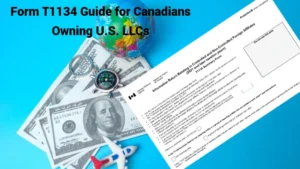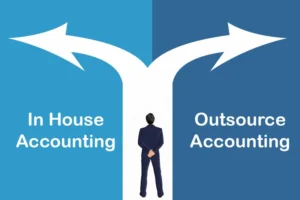No one wants to be taxed twice; that’s why there is a tax treaty between the US and Canada to avoid double taxation. The US has agreements with several countries to align tax laws and resolve the issue of double taxation. In addition, there are a couple of other methods, like Foreign Income Exclusion and Foreign Tax Credits, that also enable citizens of the US and Canada to avoid double taxation.
To improve your knowledge of double taxation and how to avoid it, here is a comprehensive guide from Sal Accounting.
Table of Contents
What is Double Taxation?
US citizens and Canadians are taxed on their worldwide income. Citizens of both countries have to report their foreign income irrespective of where they file a tax return, whether in Canada or the US. This means a US citizen earning in Canada will have to pay taxes to the Canada Revenue Agency and would also pay US taxes to Internal Revenue Services on the same income.
The following methods provide relief from getting taxed in both the United States and Canada on the same income.
How can you Avoid Double Taxation Between the US and Canada?
Foreign Earned Income Exclusion
As the name suggests, foreign income exclusion excludes the income taxed in another country. The exclusion is elected on IRS Tax Form 2555. Taxpayers who claim exclusion make domestic retirement plan contributions of any kind based on this income or claim the foreign tax credit for any taxes paid to a foreign government.
The foreign income exclusion is only applicable in the following three conditions.
- You are a US citizen or resident alien. A resident alien is a permanent resident of the country without citizenship. To fall under this classification in the US, a person needs to have a green card or have had one during the last calendar year.
- You should qualify for presence in a foreign country. It is met by satisfying the bona fide resident test by being a resident in a country. This means you have to show physical presence in the country for at least 330 days within 12 consecutive months,
- You have foreign-earned income. The income is wages or compensation through employment or self-employment services. Pensions, investments, alimony, or gambling are not foreign-earned income.
Moreover, you can only apply for foreign income exclusion if revenue is under a certain income. In 2024, the amount is $126,500. IRS adjusts the amount annually for inflation.
| Year | Foreign Earned Income Exclusion Amount |
| 2020 | $107,600 |
| 2021 | $108,700 |
| 2022 | $112,000 |
| 2023 | $120,000 |
| 2024 | $126,500 |
Foreign Tax Credit
Both the US and Canada have foreign tax credits to prevent double.
Foreign tax credits offset your US tax on income that is already taxed in Canada and vice versa. The credit cannot be more than that tax paid in Canada. Moreover, investment income is not eligible for foreign tax credits. If you have received an amount for personal services that you performed, it is a good idea to keep a complete record of work days in each country.
How Does the Foreign Tax Credit Work?
If you have paid taxes in Canada and are subjected to US taxes on the same income, you can take a credit for those taxes or an itemized deduction.
Foreign tax credit directly reduces your US tax liability. To apply for tax credit, you must complete Form 1116 and attach it to your US tax return.
Taking the tax credit makes the most financial sense because it reduces your actual tax bill instead of just lowering your taxable income.
Do I Qualify for a Foreign Tax Credit?
Not all taxes paid to foreign governments can be claimed as a credit against US federal income tax. To qualify:
- The tax must be imposed on you by a foreign country like Canada.
- You must have paid the tax to the country.
- The tax must be legal and actual foreign tax liability you paid during the year.
- The tax must be an income tax.
Remember that if you have claimed the foreign earned income exclusion, you cannot take a foreign tax credit for your income.
US-Canada Tax Treaty
The US has tax treaties with several countries to prevent double taxation. Canada is among the countries that have a tax treaty with the US. They prevent double taxation and reduce tax evasion by exchanging taxpayer information between two countries.
US tax treaty, in summary, alleviates tax issues for US citizens and residents living in Canada and Canadians living in the US.
How do I Qualify for US Tax Treaty Benefits?
Here are four cross-border income scenarios where the Canada-US treaty benefits come into play.
- You live and work in Canada as a US citizen
- You live and work in Canada for only part of the year as a US citizen
- You live in the US and cross the border for work every day
- You are a resident of both the US and Canada
How to Claim US-Canada Income Tax Treaty Benefits?
Most of the US-Canada tax treaty benefits don’t have to be claimed. But if you find yourself in one of the rare and complicated situations, then file Form 8833 and explain your situation in summary to claim the benefits.
Conclusion
Many US and Canadian citizens have financial ties with their neighbors, which makes them subjected to double taxes. To avoid double taxation between the US and Canada, both have various legal methodologies and tax treaties to save their citizens from getting taxed twice on the same income.
You can understand the tax obligations of both countries are complex, but there are ways to save taxes on your hard-earned income. That’s why choosing the best tax services specifically for cross-border taxation is essential. Sal Accounting has got the tax solution for you. Our accounting firm specializes in services tailored to US business incorporation in Canada, specifically catering to your distinct requirements.
Get started with our services today.
FAQs
Do I need to pay taxes in Canada if I work in the USA?
Suppose CRA establishes your residence status as a Canadian resident. In that case, you will have to pay income tax on income earned from anywhere in the world, even if you spend time outside Canada.
How do Foreign Tax Credits and Foreign Earned Income Exclusion Differ?
These are the two ways to avoid double taxation between the US and Canada. A main difference is the income to which each applies. The Foreign Tax Credit is applied to earned and unearned income like dividends and interest. Meanwhile, Foreign Earned Income Exclusion applies only to earned income.
What is the Foreign Earned Income Exclusion of 2024?
For 2024, the foreign-earned income exclusion is $126,500; any income below this amount for an individual will not be taxed.






